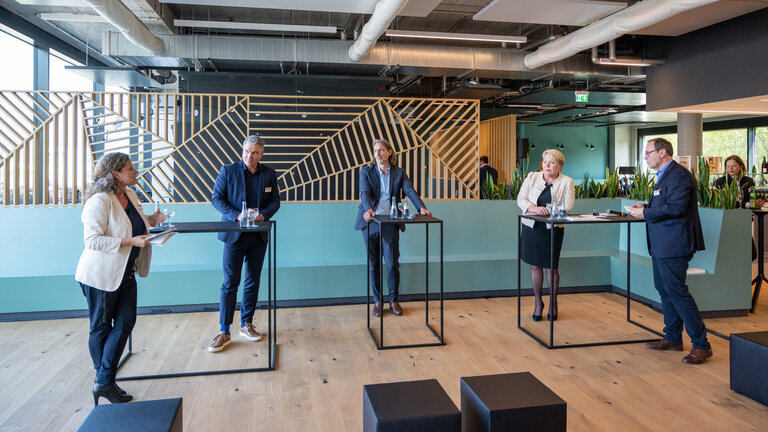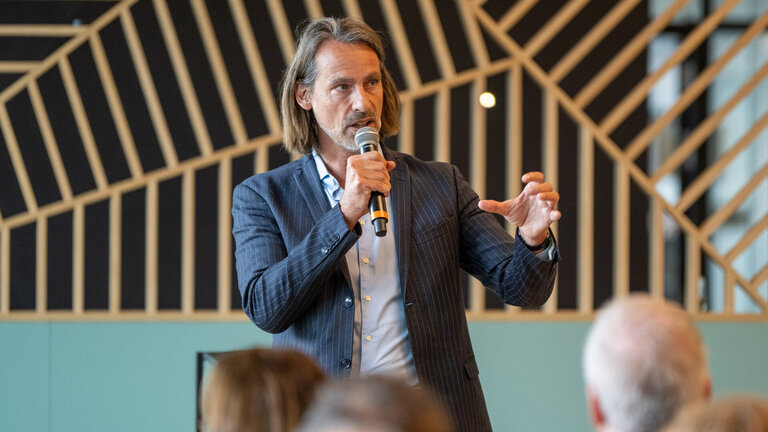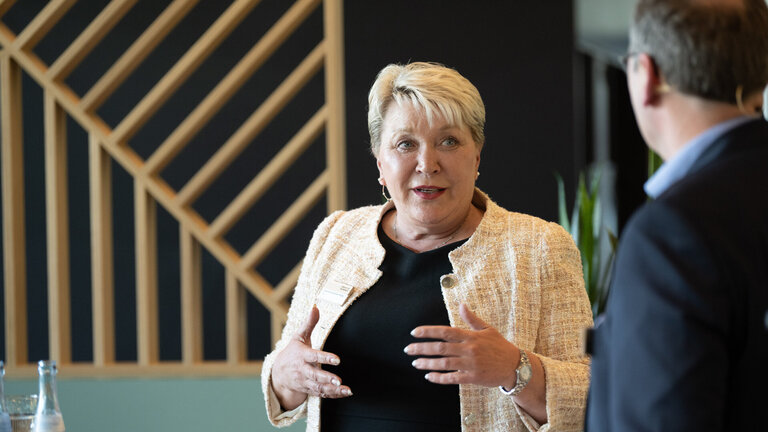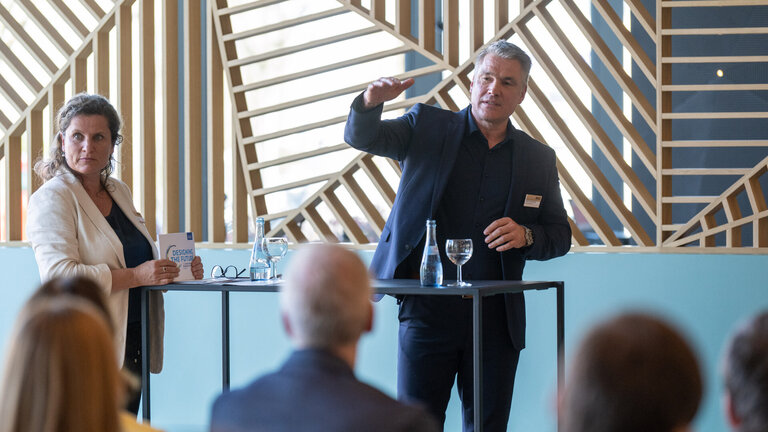Stuttgart, Germany, April 28, 2022. Climate change, scarcity of resources and a fossil, growth-driven economy – the way most people live is in sharp contrast with the devastating consequences of global warming. For the philosopher Richard David Precht, the ecological quest for solutions to the climate crisis, the consumption of resources and all of the consequences of our expansive economic activities is the central task of our age. On Wednesday, he met with Susanne Eickermann-Riepe, who chairs the European World Regional Board of the professional body RICS, and Michael Bauer, Partner at the consultancy firm Drees & Sommer SE to discuss whether the real estate industry can or must save the environment.
Anyone who is involved in a construction project or has recently completed a building knows that a building site is a sort of microcosm which reflects many of the crises of our world. Building work comes to a halt because the workers are not available because of travel restrictions caused by the Corona pandemic. Or the construction budget which was optimistically calculated is then found to be yet another transient number. The interrupted supply chain and the scarcity of personnel, resources and materials are constantly driving prices to dizzy heights. And we should not forget inflation and energy shortages, which are dramatically increasing due to the current war in Ukraine. The climate crisis holds up a mirror to our comfortable idea of new owner-occupied houses, but it also poses far more fundamental questions. Should we still allow ourselves to erect new buildings, to cover up immense areas of greenfield land, and therefore to tolerate the consumption of massive amounts of grey energy and the resulting release of CO2?
‘The concept of home ownership is deeply rooted in our society as a symbol of personal prosperity, security and success. But climate change and the digital transformation are calling these basic ideals into question. To solve the ecological question, there are two courses of action. Of course, we must promote ecological technical progress in areas such as geothermal energy, photovoltaics and much more – solutions which will be economically valuable in the long term. In principle, digital processes can also help to save large amounts of energy and resources. But the emphasis is on in principle. At present, digital processes achieve far too little in this area. So the problem cannot be solved without sacrificing our expectations and introducing prohibitions, even though this is diametrically opposed to our concept of the market economy. But if we take climate change seriously, we can no longer hold on to our accustomed ideas of the way we live, build and do business,’ explained the philosopher Richard David Precht.
From Micro to Macro Cosmos
The insights which apply to small scale projects and individuals can generally also be applied to society as a whole. Most people know about the harmful environmental problems which arise in the energy or mobility sector. But very few people realize that the construction and real estate sector is responsible for about 35 percent of global energy consumption and 50 percent of the global use of materials, and that it causes half of the worldwide waste disposal and CO2 emissions. What must be done in order to transform the construction sector from a clandestine climate killer to a rescuer of the environment? This question is the focus of Susanne Eickermann-Riepe, Chair of the European World Regional Board of the Royal Institution of Chartered Surveyors (RICS), the leading global professional association for real estate experts. She works to promote the goals of the Green Deal in the European real estate sector. The plan presented by the European Commission stipulates that the net emission of greenhouse gas in Europe should be reduced to zero by the year 2050.
Susanne Eickermann-Riepe, who for 20 years was partner at PricewaterhouseCoopers in Germany with responsibility for the real estate business said: ‘After a boom in the property market that has lasted more than ten years and provided record results, it has so far been easy for the industry to prosper. In the past, many people in our industry have been confident that property assets can outlast any crisis, but this optimism must now be reconsidered in the light of the consequences of climate change and the demands of a new and ecologically aware generation. One thing is clear: if we do not move ourselves, we will be moved by other forces – such as new regulations or social and economic pressure. Prohibitions on the sale or letting of non-sustainable buildings, which already exist in some neighboring countries, are just one example.’
The Conflict Situation of the Construction and Real Estate Sector
The real estate expert Susanne Eickermann-Riepe says that one factor which contributes to the slow progress of climate goals in the construction sector is that ‘the EU time frame target of 2050, or 2045 in Germany, actually blocks any faster action.’ But in her opinion there are also much deeper conflicting social, political and economic targets, and an example of these conflicts can be seen in the residential sector. More residential accommodation is urgently needed and must be affordable – and at the same time it should be ecological. But the required sustainability costs money - so who should pay for it? And how can the construction of new homes be reconciled with the scarcity of resources? What can the industry contribute? ‘We must accept that more than profit is at stake here. Responsibility is not just a trend, it is an attitude. We can make an important contribution on behalf of the people and the planet. Some people are already willing to sacrifice their yield targets, to carry out sustainable renovations in existing buildings and to invest in projects with a social impact, but many more must join them.’
Circular Systems instead of One-Way Streets
Drees & Sommer Partner Michael Bauer confirmed that some investors, project developers and tenants change their views but noted that ‘they are too few, and progress is too slow. The incentive systems are simply not sufficient to achieve goals such as the decarbonization of heating in existing buildings. At present, only one in 100 buildings in Europe is being renovated to make it energy-efficient, although around 85 percent of all buildings can be considered old. So there is an enormous potential for saving energy for the climate.’
Since 1999, Michael Bauer has developed innovative energy concepts for Drees & Sommer. The most prominent example is the town hall in the Stühlinger district in the German city of Freiburg, which was completed in 2017. It is regarded as the first net plus energy building in the world and was awarded the German Sustainability Prize in 2018. The building produces energy from renewable sources such as solar and geothermal energy and covers its own electricity needs by means of photovoltaic systems in the façade and on the roof.
However for Drees & Sommer Partner Michael Bauer the protection of the environment must encompass more than just energy efficiency, CO2 savings and the use of renewable energy in the buildings sector. ‘If we want to ensure that the future of our planet is not just dangling by a thread, our economic one-way streets must be replaced by ecological circular systems. In the construction and real estate sector, the material life cycle is also designed as a one-way street. Metal, concrete, timer, minerals: raw materials are extracted, processed, sold, used and finally disposed of. It is true that some of them are recycled. But this is usually at the expense of the quality.’
Blueprint for Sustainable Building
The event location at Obere Waldplätze 12 in Stuttgart (short name: OWP12), where the environmental debate took place, is an excellent example of how things can work in a different way. The net plus energy building was designed to be recyclable as far as possible, generating more energy than it consumes in operation. This is achieved in part by a newly developed, highly insulated façade construction, photovoltaic systems on the roof and on the southern façade, the use of geothermal energy via geothermal boreholes, and the greening of the northern façade.
The Cradle to Cradle principle (C2C) was used to ensure the building's recyclability, the absence of harmful substances, and ease of dismantling. As a result, construction materials can be recycled in high quality, or returned to a biological cycle, after a building has been demolished at a later date. Information on the materials used and their chemical composition is provided by a material passport, as planned pursuant to the coalition agreement of the new federal Government. Winfried Kretschmann, Minister-President of the German State of Baden-Württemberg, and Stuttgart’s Lord Mayor, Dr. Frank Nopper, hailed the showcase project as a blueprint for climate-friendly construction, an inspiration for the entire buildings sector.



